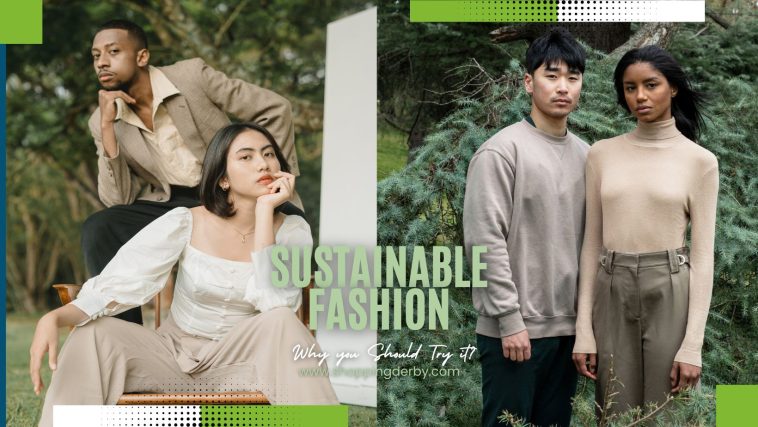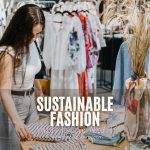A Change in Fashion is Needed Now
Fashion is more than just a reflection of personal style—it’s a massive global industry that touches every part of society and the environment. However, the rise of “fast fashion” has led to unsustainable practices that exploit workers, harm ecosystems, and contribute significantly to climate change. In contrast, the benefits of sustainable fashion offers an ethical and eco-friendly alternative that benefits both people and the planet. But why is it so important, and why is now the time to act? Let’s dive in.
The truth is, adopting sustainable fashion is not just about saving the environment—it’s about creating a system that values fairness, reduces waste, and promotes thoughtful consumption. And the best part? You don’t need to sacrifice style or break the bank to make a difference. Here’s why sustainable fashion should be your priority today.
What is Sustainable Fashion?
Sustainable fashion encompasses clothing production practices that prioritize environmental health, ethical labor conditions, and long-lasting quality. This approach minimizes waste, uses eco-friendly materials, and ensures workers are paid fairly for their labor. Unlike fast fashion, which focuses on rapid production and disposable trends, sustainable fashion promotes conscious consumption and a reduced carbon footprint.
7 Benefits of Sustainable Fashion and Why you Should Try it
1. Environmental Preservation
Sustainable fashion significantly reduces the environmental impact of clothing production. Fast fashion relies on intensive water usage, harmful chemicals, and carbon emissions. For instance, producing one cotton t-shirt in conventional ways can consume up to 2,700 liters of water. Sustainable fashion mitigates these effects by opting for organic cotton, recycled materials, and innovative practices like waterless dyeing. Additionally, it addresses the issue of textile waste, as over 92 million tons of discarded clothing are generated annually. Brands like Tentree and Reformation are leading efforts to minimize these impacts through eco-friendly operations.
2. Social Justice and Fair Labor Practices
Ethical labor practices are a cornerstone of sustainable fashion. Many fast-fashion workers face unsafe conditions and meager wages, with an estimated 85% of garment workers earning below a living wage. Sustainable fashion brands, such as People Tree and ABLE, emphasize fair wages, safe working environments, and transparency in their supply chains. Supporting these brands ensures that your clothing choices contribute to the well-being of the workers behind them.
3. Healthier Options for Consumers and Workers
The toxic chemicals used in conventional fashion, like azo dyes and formaldehyde, can harm both consumers and factory workers. These substances pollute waterways and can cause skin irritation or long-term health issues. Sustainable fashion eliminates these risks by using non-toxic dyes and natural fibers like organic cotton and hemp, which are safer for both wearers and the environment. For example, Pact and Amour Vert prioritize chemical-free processes, ensuring safety at every stage.
4. Encourages Thoughtful Consumption
Fast fashion promotes a throwaway culture, with clothing often discarded after only a few wears. Sustainable fashion challenges this mindset by advocating for quality over quantity. A well-made garment may cost more upfront but often lasts for years, reducing overall expenses and waste. Capsule wardrobes, built on timeless and versatile pieces, embody this philosophy. For instance, brands like Taylor Stitch and Eileen Fisher create durable and classic designs to encourage longevity.
5. Reduces Overproduction and Resource Exploitation
Overproduction is a significant issue in the fashion industry, with unsold inventory often destroyed or discarded. Sustainable fashion employs made-to-order or limited production models, preventing excess inventory. This shift not only saves resources like water and energy but also ensures that every item produced has a purpose. Brands like Ninety Percent and Outerknown are setting new standards with their focus on producing only what’s needed.
6. Supports Circular Economy Practices
Sustainable fashion encourages a circular economy, where materials are reused, recycled, or composted instead of being thrown away. Initiatives like Patagonia’s Worn Wear program or Eileen Fisher’s Renew line allow customers to return old garments to be repaired, resold, or transformed into new products. This approach reduces waste and keeps clothing out of landfills.
7. Promotes Community and Global Impact
By choosing sustainable fashion, you’re not just making an individual choice but contributing to global change. Supporting ethical brands encourages the entire industry to adopt better practices, from reducing carbon emissions to supporting underprivileged communities. Organizations like Fair Trade and GOTS certification ensure that every purchase aligns with values of sustainability and social responsibility.
Sustainable fashion is not just a trend—it’s a necessary shift toward a more ethical and eco-conscious future. Each purchase is a vote for better practices, healthier ecosystems, and improved livelihoods.
Best Sustainable Fashion Brands
Adopting sustainable fashion doesn’t mean compromising on style. Many brands combine chic designs with ethical practices, ensuring you look good while doing good.
1. Reformation
Reformation is celebrated for its modern, trend-inspired designs made from deadstock fabrics and eco-friendly materials. Their dresses, tops, and jeans are produced using water-saving techniques and energy-efficient processes. With a commitment to transparency, they offer chic styles without compromising on sustainability.
2. People Tree
People Tree offers handmade, fair-trade-certified clothing crafted from organic cotton and sustainable fabrics. Known for vibrant prints and timeless pieces, they blend artisanal craftsmanship with eco-friendly practices. Their collections highlight ethical production at every stage.
3. Pact
Pact specializes in everyday essentials, such as comfortable basics and loungewear, made from GOTS-certified organic cotton. Their affordable, high-quality pieces are produced in fair-trade-certified factories. From underwear to bedding, their products promote ethical and sustainable living.
4. ABLE
ABLE creates timeless apparel and accessories, such as handbags and denim, with a focus on empowering women through ethical production. Their transparent pricing ensures fair wages for artisans, and their durable products are built to last. They also offer free lifetime repairs for their goods.
5. Tentree
Tentree designs casual, everyday clothing like hoodies, t-shirts, and activewear using sustainable materials such as Tencel and organic cotton. With every purchase, they plant ten trees, supporting reforestation projects worldwide. Their eco-conscious packaging and supply chain amplify their environmental efforts.
6. Ninety Percent
This London-based brand produces contemporary basics and knitwear from organic and biodegradable materials. Their minimalist styles prioritize comfort and versatility, and they share 90% of their profits with charitable causes. Their transparency extends to showcasing their ethical production process.
7. Patagonia
Patagonia is a leader in sustainable outdoor apparel, offering high-performance jackets, fleeces, and activewear made from recycled and organic materials. They actively campaign for environmental conservation and repair damaged items to extend their life. Their commitment to eco-friendly innovation is unmatched.
8. Amour Vert
Amour Vert creates elegant and sustainable clothing such as soft tees, dresses, and sweaters using Tencel, organic cotton, and other low-impact fabrics. They emphasize small-batch production to reduce waste and plant a tree for every t-shirt sold. Their local manufacturing supports eco-conscious practices.
9. Outerknown
Outerknown blends casual, surf-inspired aesthetics with sustainability, offering items like button-down shirts, chinos, and swimwear made from recycled and organic fibers. They ensure fair wages for workers and prioritize circular fashion through repair and resale programs. Their designs focus on durability and style.
10. Kotn
Kotn delivers premium basics such as t-shirts, hoodies, and bedding made from sustainably sourced Egyptian cotton. They support smallholder farmers and invest in community education initiatives. Their products are celebrated for their softness, longevity, and ethical manufacturing.
11. Taylor Stitch
Taylor Stitch offers versatile menswear staples, including rugged shirts, chinos, and outerwear, crafted from recycled or responsibly sourced fabrics. They emphasize durability and timeless design, ensuring their pieces remain wardrobe favorites for years. Their commitment to reducing waste makes them a standout choice.
12. Girlfriend Collective
Girlfriend Collective produces activewear such as leggings, bras, and shorts made from recycled water bottles and fishing nets. Their inclusive sizing and vibrant colors appeal to a wide audience, and they emphasize ethical labor in production. Each piece combines functionality with environmental responsibility.
13. Eileen Fisher
Eileen Fisher creates minimalist, high-quality clothing such as blouses, trousers, and outerwear using organic and sustainable materials. Their Renew program promotes circularity by recycling old garments into new designs. The brand champions fair wages and environmentally conscious practices.
14. Veja
Veja produces stylish and comfortable sneakers using organic cotton, wild rubber, and recycled materials. Their ethical production process ensures fair wages for workers, and their designs blend classic and modern aesthetics. The brand’s commitment to transparency sets it apart in the footwear industry.
15. Stella McCartney
Stella McCartney’s luxury collections include eco-friendly designs such as tailored suits, evening wear, and accessories made without animal products. They innovate with materials like vegan leather and recycled polyester. Known for high fashion with a conscience, they lead the charge in sustainable luxury.
How to Embrace Sustainable Fashion: A Detailed Guide
Adopting sustainable fashion may seem daunting at first, but with a few mindful changes, anyone can start making an impact. Here’s a closer look at actionable steps to make sustainable fashion a part of your lifestyle:
1. Start with Your Closet
- Audit Your Wardrobe: Before buying new items, take stock of what you already own. Many forgotten gems can be repurposed or styled differently to feel brand new.
- Repair and Revive: Instead of discarding damaged clothes, try repairing or altering them. Basic sewing skills or a visit to a tailor can extend the life of your favorite pieces.
2. Shop Secondhand and Vintage
- Thrift Stores and Consignment Shops: These are treasure troves for unique, affordable, and eco-friendly finds. Apps like ThredUp and Poshmark make secondhand shopping even more accessible online.
- Vintage Pieces: Invest in timeless, high-quality vintage items that carry history and durability.
3. Support Sustainable Brands
- Research Before You Buy: Look for brands with certifications like GOTS (Global Organic Textile Standard), Fair Trade, or Climate Neutral. Websites like Good On You can help you evaluate the sustainability of various brands.
- Prioritize Transparency: Choose companies that openly share their production practices, materials used, and labor policies.
4. Embrace Minimalism
- Capsule Wardrobe: Build a capsule wardrobe with versatile pieces that can be mixed and matched. This reduces the need for excess clothing while ensuring you’re always stylish.
- Mindful Purchases: Avoid impulse buying. Before purchasing, ask yourself if you’ll wear the item at least 30 times.
5. Opt for Sustainable Fabrics
- Choose Eco-Friendly Materials: Look for organic cotton, hemp, Tencel, and recycled fabrics. These materials use less water and energy during production and are biodegradable.
- Avoid Synthetics: Materials like polyester and nylon are made from fossil fuels and contribute to microplastic pollution when washed.
6. Rent Instead of Buy
- Clothing Rental Services: Platforms like Rent the Runway or HURR allow you to rent high-quality clothing for special occasions, reducing waste and saving money.
7. Practice Circular Fashion
- Swap Clothes: Organize clothing swaps with friends or participate in community events to refresh your wardrobe without buying new items.
- Recycle or Upcycle: When clothes reach the end of their life, recycle them at dedicated drop-offs or get creative and transform them into something new, like tote bags or pillowcases.
8. Extend the Lifespan of Your Clothes
- Wash with Care: Use cold water, eco-friendly detergents, and air dry whenever possible to reduce energy use and fabric wear.
- Store Properly: Keep your clothes in good condition by storing them in a clean, dry place and using quality hangers or folding methods.
9. Educate Yourself and Advocate for Change
- Stay Informed: Learn about the impacts of fast fashion through documentaries like The True Cost and resources from ethical fashion advocates.
- Spread Awareness: Share your knowledge with friends and family to encourage collective change. Consumer demand drives industry practices
Challenges to Sustainable Fashion
Despite its benefits, sustainable fashion can be costly due to ethical labor practices and higher-quality materials. However, the cost reflects the true value of responsible production. Additionally, some brands engage in “greenwashing,” claiming to be sustainable without actual transparency. As a consumer, research is key—trust brands that disclose their practices and have credible certifications.
Why You Should Choose Sustainable Fashion Now
The benefits of sustainable fashion extend far beyond aesthetics. It’s about making a conscious decision to protect our planet, uplift workers, and foster a culture of thoughtful consumption. Every purchase you make sends a message to the fashion industry, demanding better practices and accountability. By choosing sustainability, you’re contributing to a cleaner environment, ethical labor conditions, and a more responsible future.
The time to act is now. Fast fashion’s impact on the environment and society grows more severe each day. By embracing sustainable practices, you can help rewrite the story of fashion—making it one that values quality over quantity, compassion over exploitation, and innovation over waste. Together, we can redefine what it means to dress stylishly and responsibly.



